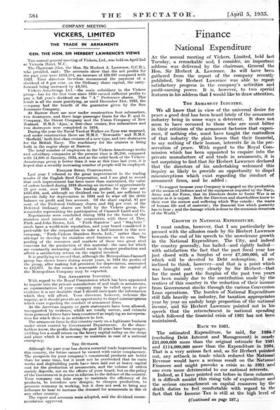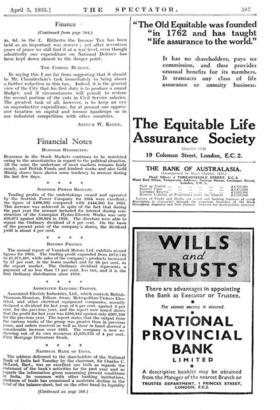Finance
National Expenditure
AT the annual meeting of Vickers, Limited, held last Tuesday, a remarkable and; I Consider, an important address was delivered by the chairman, General the Hon. Sir Herbert A. Lawrence. ' As will have been gathered from the report of. the company recently published, Sir Herbert Lawrence- was able to report satisfactory progress in the company's activities and profit-earning power. It is, however, to two special features in his address that I would like to 'draw attention.
THE ARMAXENT INDUSTRY.
• -
We all know that in view of the universal desire for peace a good deal has been heard lately of the armament industry being in some ways a deterrent. It does not seem to have occurred to those who are most bitter in their criticism of the armament factories that experi- ence, if nothing else, must have taught the controllers of that industry the plain lesson that their financial, to say nothing of their human, interests lie- in the pre- servation of peace. With regard to the Royal Com- mission which has been appointed to enquire into the private manufacture of and trade in armaments, it is not surprising to find -that Sir Herbert Lawrence declared that the directors of his undertaking welcomed this inquiry as likely to provide an opportunity to dispel misconceptions which exist regarding the _ conduct of armament firms, and he . added : "To-suggest because your Company is engaged on the produetioh of the means of Defence and of the equipment requited by the Navy, Army and Air Force, that its Directors desire to foster War is as untrue as it is unjust. Both the Directors and shareholders know to their cost the sorrow and suffering which War entails : the waste of human life and of material ; the financial loss which posterity has to bear ; and the damage which is done to the economic structure , of the World."
• GROWTH IN NATIONAL EXPENDITURE.
. I must confess, however, that I am particularly pressed with the allusion made by Sir -Herbert Lawrence towards the end of his speech to the unwelcome growth in the National Expenditure. The City, and indeed the country generally, has hailed—and rightly hailed— with satisfaction the fact that the past -fiscal year has just dosed with a Surplus of over £7,590,000, all of which will be devoted to Debt redemption. I am inclined to think, however—and that is a point which was brought out very clearly by Sir' Herbert—that for the most part the Surplus of the past two years has bech 'mainly due to the contribution made' by the rentiers of this country in the reduction of their income from Government stocks through the various Conversion Loan operations. The burden of National Expenditure still falls heavily on industry, for taxation appropriates year by year an unduly large proportion of the national income, and Sir Herbert Lawrence pointed Out inilis speech that the retrenchment in national spending which followed the financial crisis of 1931 has not been maintained,
BACK TO 1931.
The estimated Expenditure, he said, for 1934-5 (excluding Debt Interest and Management) is nearly £21,000,000 more than the original estimate for 1931 and £114,000,000 more than the Expenditure in 1924. That is a very serious fact and, as Sir Herbert pointed out, any setback in trade which reduced -the National Revenue would have a serious result on the National Finances and might provoke a crisis as in 1931 and one even more detrimental to our national interests.
Indeed, as I have pointed out before in these columns, it is difficult amidst this rising tide of expenditure and the serious encroachment on capital resources by the death duties to feel comfortable with regard to the fact that the Income Tax is still at the high level of (Continued on page 587.)
Finance •
(Continued- from page 584.) 4s. 6d. in the E. Hitherto the Income Tax has been held as an important war reserve ; yet after, seventeen years of peace we still find it at a war level, even though admittedly, our expenditure on National Defence has been kept down almost to the danger point.
THE COMING BUDGET.
- In saying, this I am far from suggesting that it should be Mr. Chamberlain's task immediately to bring about a further-reduction in this tax. Indeed, it is the general view of the City that his first duty is to produce a sound Budget, and if circumstances will permit to restore the second portion of the cuts in Civil Service salaries. The greatest task of all, however, is to keep an eye on unproductive expenditure, for at present our oppres- sive taxation on capital and income handicaps us in our industrial competition with other countries.
ARTHUR W. KIDDY.











































 Previous page
Previous page